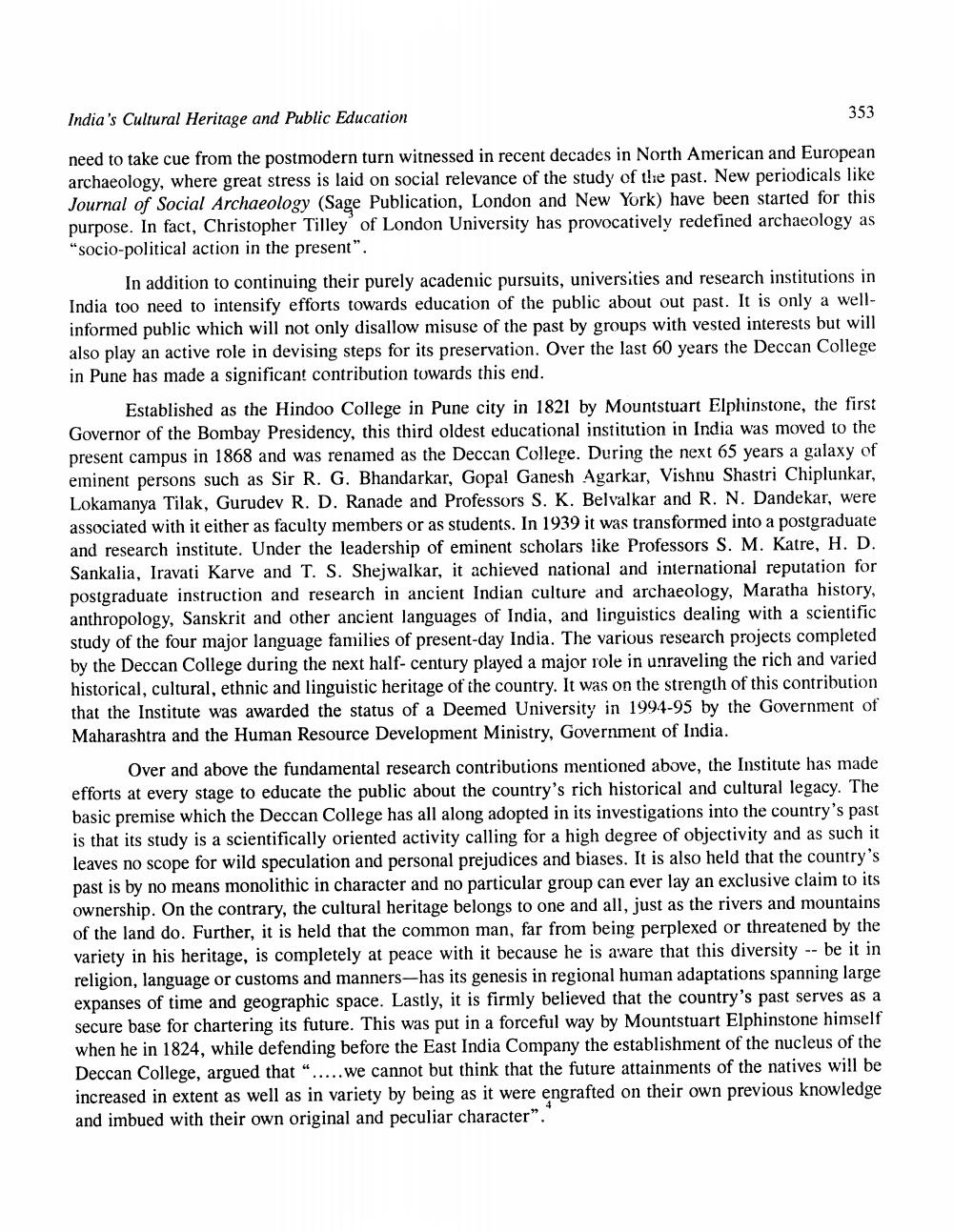________________
India's Cultural Heritage and Public Education
353
need to take cue from the postmodern turn witnessed in recent decades in North American and European archaeology, where great stress is laid on social relevance of the study of the past. New periodicals like Journal of Social Archaeology (Sage Publication, London and New York) have been started for this purpose. In fact, Christopher Tilley of London University has provocatively redefined archaeology as "socio-political action in the present".
In addition to continuing their purely acadenric pursuits, universities and research institutions in India too need to intensify efforts towards education of the public about out past. It is only a wellinformed public which will not only disallow misuse of the past by groups with vested interests but will also play an active role in devising steps for its preservation. Over the last 60 years the Deccan College in Pune has made a significant contribution towards this end.
Established as the Hindoo College in Pune city in 1821 by Mountstuart Elphinstone, the first Governor of the Bombay Presidency, this third oldest educational institution in India was moved to the present campus in 1868 and was renamed as the Deccan College. During the next 65 years a galaxy of eminent persons such as Sir R. G. Bhandarkar, Gopal Ganesh Agarkar, Vishnu Shastri Chiplunkar, Lokamanya Tilak, Gurudev R. D. Ranade and Professors S. K. Belvalkar and R. N. Dandekar, were associated with it either as faculty members or as students. In 1939 it was transformed into a postgraduate and research institute. Under the leadership of eminent scholars like Professors S. M. Katre, H. D. Sankalia, Iravati Karve and T. S. Shejwalkar, it achieved national and international reputation for postgraduate instruction and research in ancient Indian culture and archaeology, Maratha history, anthropology, Sanskrit and other ancient languages of India, and linguistics dealing with a scientific study of the four major language families of present-day India. The various research projects completed by the Deccan College during the next half-century played a major role in unraveling the rich and varied historical, cultural, ethnic and linguistic heritage of the country. It was on the strength of this contribution that the Institute was awarded the status of a Deemed University in 1994-95 by the Government of Maharashtra and the Human Resource Development Ministry, Government of India.
Over and above the fundamental research contributions mentioned above, the Institute has made efforts at every stage to educate the public about the country's rich historical and cultural legacy. The basic premise which the Deccan College has all along adopted in its investigations into the country's past is that its study is a scientifically oriented activity calling for a high degree of objectivity and as such it leaves no scope for wild speculation and personal prejudices and biases. It is also held that the country's past is by no means monolithic in character and no particular group can ever lay an exclusive claim to its ownership. On the contrary, the cultural heritage belongs to one and all, just as the rivers and mountains of the land do. Further, it is held that the common man, far from being perplexed or threatened by the variety in his heritage, is completely at peace with it because he is aware that this diversity -- be it in religion, language or customs and manners-has its genesis in regional human adaptations spanning large expanses of time and geographic space. Lastly, it is firmly believed that the country's past serves as a secure base for chartering its future. This was put in a forceful way by Mountstuart Elphinstone himself when he in 1824, while defending before the East India Company the establishment of the nucleus of the Deccan College, argued that “..... we cannot but think that the future attainments of the natives will be increased in extent as well as in variety by being as it were engrafted on their own previous knowledge and imbued with their own original and peculiar character".




